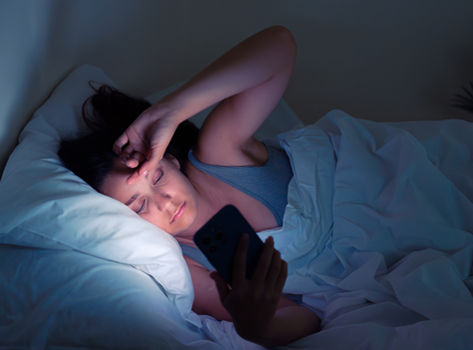
Do you delay bedtime to gain some extra leisure time? If so, you may be part of a growing trend known as sleep procrastination. But sleep experts say choosing “you time” over sleeping isn’t a very good tradeoff — and can do more harm than good in the long run.
“Getting a good night’s sleep needs to be prioritized,” says Federico Cerrone, MD, a sleep specialist at Atlantic Health System. “Sleep procrastination is when people purposefully delay their bedtime, and this can contribute to sleep deficiency, insomnia and a host of health problems.”
Start With Behavior Modifications
- Establish a routine. Have an end-of-day routine that starts about an hour before it’s time to fall asleep. It may include meditation or breathwork.
- Set your bedtime. Aim to fall asleep around the same time every night so you get the recommended seven to eight hours of sleep.
- Drink tea. Non-caffeinated lavender, chamomile and herbal bedtime teas can help you relax and unwind before bed.
- Stay awake during the day. Stay active, alert, and keep any napping to less than about 20 minutes.
- Schedule “you time”. Build downtime into your day instead of into your bedtime routine.
- Avoid stimulants. Limit your caffeine intake to mornings only.
- Cut screen time. Turn off your devices an hour before bedtime.
- Create sleep space. Make your bedroom a cozy retreat for rest and relaxation.
- Lower the temperature. Cool nights and fresh air make falling asleep and staying asleep easier.
Long-Term Effects
“The best way to get enough sleep each night is by going to bed and waking up around the same times each day,” says Dr. Cerrone. “Poor sleep patterns will leave you feeling tired during the day, awake at night, and out of alignment with your body’s natural rhythms.”
Dr. Cerrone explains that poor sleep can show up as fatigue, irritability and diminished mental clarity. It can affect your mood and productivity. It can also contribute to a host of medical conditions, from dementia, obesity and diabetes to high blood pressure and heart disease.
Breaking the Procrastination Cycle
“Sleep procrastination can get worse over time,” says Dr. Cerrone, “but research shows that people can improve their sleep habits with a few lifestyle and behavior changes. Teach your body what you want it to do at bedtime. Although it takes time to adapt to new behaviors, your body will get used to it.”
If behavior modifications don’t seem to help, talk with your doctor. They may refer you to a sleep specialist who can evaluate your condition, discuss treatment options, and help you improve your sleep patterns.
Be Proactive About Your Health
To stay safe and healthy, it's good to have a primary care provider who knows and understands your health history and wellness goals.